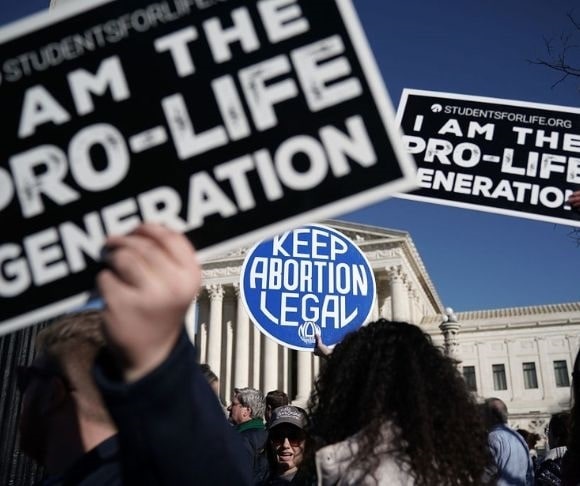
(Photo by Alex Wong/Getty Images)
Democratic Party politicians, the left-wing media, and abortion activists everywhere are in a panic. The leaked draft of Justice Samuel Alito’s opinion in Dobbs v. Jackson Women’s Health has the whole country imagining America without Roe v. Wade. Many spread a false vision of abortion blocked nationwide; others come much closer to the truth. Before that fateful decision in 1973, the issue was regulated at the state level, if at all, and that’s precisely what we’ll return to should Roe indeed be overruled. Rather than argue the merits of abortion for any reason or the various relevant judicial decisions, let’s take a look at the laws across the states – at least those that would restrict the practice – and dispel any illusions that may have been crafted by the fearmongers and peddlers of outrage.
Alabama
Before Roe, Alabama state law prohibited all abortions in the state, except in order to preserve the life or health of the mother. That law was last amended in1951, and it remains on the books, even if currently unenforceable. In 2018, the voters approved an amendment to the state’s constitution saying explicitly that there’s no right to abort, and in 2019, Gov. Kay Ivey signed into law a measure banning all abortions except in cases of medical emergencies risking the mother’s life, fetal conditions that would cause stillbirth, or when a psychiatrist certifies that any woman with a “serious mental illness” would kill herself or the child if she gave birth.
With Roe overturned, abortion would be banned entirely in this state except for specific medical situations. Performing an abortion would be a felony offense for the practitioner.
Arizona
One of the first laws passed in the territory of Arizona was an abortion ban from 1864. That law prohibits performing or helping to perform an abortion unless necessary to save a woman’s life. It’s still on the books and calls for a prison sentence of no fewer than two and no more than five years for abortion providers. In 2021, the legislature approved a modern 15-week ban. The old one once called for a minimum one-year sentence for women attempting to “procure a miscarriage,” but that section was repealed in 2020.
With both laws in effect, terminating a pregnancy at any point would be a felony for any medical provider outside of emergencies.
Arkansas

(Photo by Alex Wong/Getty Images)
The first abortion restriction in Arkansas was passed in 1837 and only applied to women “pregnant with quick child,” but also including an exception if necessary to save the mother’s life. By 1975, the state passed an updated and more scientific law, removing the so-called “quickening” from the equation. In 2021, Governor Asa Hutchinson signed a bill that outlawed all abortions except for those to save the life of the mother. With Roe out of the way, the law would be enforceable, banning elective abortions at any point in the pregnancy.
Florida
An abortion ban with medical exception was in place in Florida as early as 1900. Abortion activists attempted to get a more permissible law passed in 1971 but failed. The 1973 Roe decision rendered the old law unenforceable, however, as it did in all states. A new law, signed by Governor Ron DeSantis in April, will ban all abortions after 15 weeks (the old law granted 24 weeks), save those to save the life of the mother or when there’s potential for a serious injury or if the fetus has a fatal abnormality.
By state legislation, abortion will be outlawed in Florida up until the 15th week of pregnancy, except for in medical emergencies, but the laws, new and old alike, may not hold up to in-state judicial review. In 1980, Florida voters approved Article 1, Section 23 of the state constitution. This grants a right to privacy. Though it doesn’t mention abortion explicitly, the state supreme court ruled this section extends to a woman’s right to terminate a pregnancy as recently as the 2017 case Gainesville Women’s Care, LLC v. Florida.
Georgia
Released on the same day as Roe v. Wade, the US Supreme Court in Doe v. Bolton declared unconstitutional Georgia’s requirement that a woman wanting an abortion must show that a continuation of the pregnancy would endanger her life or permanently injure her, that the fetus would likely be born with a grave, permanent, and irremediable mental or physical defect, or that the pregnancy resulted from forcible or statutory rape. After Roe and Doe, however, abortion was legal for any reason up to 22 weeks.

Brian Kemp (Photo by Elijah Nouvelage/Getty Images)
In 2019, however, Governor Brian Kemp signed into law a bill that prohibits terminating any pregnancy after cardiac activity is detected, except in order to save either the mother or the baby. There’s also an exception for pregnancies resulting from rape or incest, so long as an official police report has been filed, that extends out to 20 weeks gestational age.
The new law is tied up in court and wouldn’t necessarily go into effect as soon as Roe is overruled, but it likely wouldn’t remain tied up too long, as the older decision is the justification for the current suit.
Idaho
By 1950, Idaho had a law declaring any woman who had an abortion or actively sought one guilty of a criminal offense. Roe rendered this unenforceable, but the state later passed a law banning abortions after 22 weeks.
The new law in Idaho, passed in March of this year and almost immediately stayed by the state’s supreme court, bans any abortions after six weeks, except for cases of rape, incest, or medical emergency. It is currently blocked by the state supreme court, but the case is on hold pending the outcome of the Dobbs SCOTUS case.
Indiana

(Photo by Chip Somodevilla/Getty Images)
At present, abortion is legal in Indiana up to the 22nd week of pregnancy, and beyond in cases of medical emergency or fatal fetal conditions. The state’s Republican majority attempted and failed to pass a trigger law of its own in 2019, but another attempt is expected to be made should the leaked draft stand and become the official opinion of the Court.
Seven Down …
In these first seven states, some of the modern laws are more restrictive than the old ones in place when SCOTUS ruled in Roe. However, neither then nor now, do any states ban all abortions without any exception. At the most restrictive, fetal heartbeat is the tipping point. Even after that, the woman is protected against an obligation to die or even suffer significant injury for the child. Others are more permissive, allowing women to terminate a pregnancy for any reason out to 22 weeks, and at any point beyond should there be a medical emergency for the mother, a fatal flaw in the fetus, or if the pregnancy was the result of rape or incest.
In Part II, we’ll examine the laws from another seven states, from Kentucky to Montana alphabetically.
Remember to check out the web’s best conservative news aggregator
Whatfinger.com — the #1 Alternative to the Drudge

